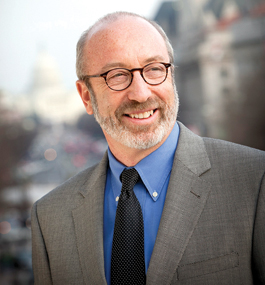For Top Economist, a Novel Idea

Sometimes a breakthrough is years in the making. For Michael Klein ’80, a Tufts University professor who is now on leave working as chief economist in the U.S. Treasury Department’s international affairs division, all it took was a good night’s sleep.
“One morning in April 2007,” he says, “I awoke with the opening lines of a novel in my head. The next morning, I woke up with the title. Within seven weeks, I had hammered out the entire first draft.”
For a first-time fiction writer, the pace was astonishing. “My intellectual efforts typically are directed at explaining exchange rates and the roots of trade imbalances. Still, as I worked on the novel, I found the challenges of constructing the story and developing the characters surprisingly close to the demands of writing research papers,” he notes.
In early September, “Something for Nothing,” which chronicles the tenure quest and professional insecurities of a young professor in a small-town liberal arts college, was released by MIT Press. Prepublication reviews called it engaging and humorous.
In stepping outside his discipline, Klein admits he took inspiration from his wife, Susan Cohen ’80, a distinguished immigration lawyer who was so moved by the events of September 11, 2001, that she began writing songs about the people affected and recorded them on a CD.
In another way, though, he was returning to an earlier passion.
“I had entered Brandeis,” he says, “planning to major in English, with an eye toward becoming a writer. But after my first economics course (and some unfortunate experience with English courses), I learned about the concept of competitive advantage.”
It’s an economist’s joke. What he means, it seems, is that he displayed an unexpected talent in economics but was bedazzled by the superior gifts of many English classmates. Lesson learned: Sell your best product.
His particular advantage led him to a Ph.D. from Columbia and a named chair in economics at Tufts’ Fletcher School of Law and Diplomacy, where he has taught for 20 years. His research articles and books are cited widely, and students reportedly enjoy his classes in areas ranging from international macroeconomics to the underpinnings of the current financial crisis — especially the way he uses humor to facilitate the teaching of technical material.
“Comparative advantage makes sense,” he quips.
In one of life’s landmark coincidences, Klein says he got the nod — and a contract — from MIT Press during the same 2010 week when he was tapped to serve in the U.S. Department of the Treasury.
“Treasury called me out of the blue, and, while I was surprised by the call, the timing felt right. Our kids were out of the house, and I was happy to help support the current administration,” says the economist, who had previously served as visiting scholar at the Federal Reserve and International Monetary Fund.
In his current setting, he turns out policy papers at the rapid clip of about one a week, reporting to the undersecretary of the treasury, who passes Klein’s best ideas along to the secretary and, on occasion, to President Obama.
“In academe,” Klein explains, “everything you do is visible and tangible in an immediate way. It’s like you’re the sole proprietor of a small business. At Treasury, you’re part of a large organization, so you don’t necessarily see the direct impact of your policy analysis and recommendations. They become part of a bigger mix that helps inform the policymakers.”
— Theresa Pease
